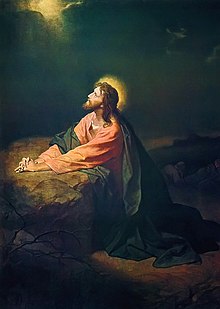Agony in the Garden: Difference between revisions
m robot Adding: hr:Isus na Maslinskoj gori |
No edit summary |
||
| Line 1: | Line 1: | ||
The '''Agony in the Garden''' refers to the events in the life of [[Jesus]] between [[the Last Supper]] and [[Arrest of Jesus|Jesus' arrest]]. Jesus' struggle (Greek agonia) praying and discussing with God, before accepting his sacrifice, before his arrest in the Garden of Gethsemane also denotes a state of mind - agony. |
The '''Agony in the Garden''' refers to the events in the life of [[Jesus]] between [[the Last Supper]] and [[Arrest of Jesus|Jesus' arrest]]. Jesus' struggle (Greek agonia) praying and discussing with God, before accepting his sacrifice, before his arrest in the Garden of Gethsemane also denotes a state of mind - agony. |
||
==Scriptural depiction== |
==Scriptural depiction==woooowww!!! thatsa creappy!!!!! fer corona |
||
[[File:Gethsemane_Carl_Bloch.jpg|thumb|225px|right|An angel comforting Jesus, painting by [[Carl Heinrich Bloch]]]] |
[[File:Gethsemane_Carl_Bloch.jpg|thumb|225px|right|An angel comforting Jesus, painting by [[Carl Heinrich Bloch]]]] |
||
According to all four [[Gospel]]s, immediately after the Last Supper, Jesus took a walk to pray in the [[Gethsemane|Garden of Gethsemane]], accompanied by [[St. Peter]], [[St. John the Apostle|St. John]] and [[St. James the Greater]], whom he asked to stay awake and pray. He moved "a stone's throw away" from them, where he felt overwhelming sadness and anguish, and said "My [[God the Father|Father]], if it is possible, let this cup pass me by. Nevertheless, let it be as you, not I, would have it." Then, a little while later, He said, "If this cup cannot pass by, but I must drink it, your will be done!" ({{bibleverse||Matthew|26:42|NAB}}). He said this prayer three times, checking on the three apostles, between each prayer and finding them asleep. He comments: "The spirit is willing, but the flesh is weak". An angel came from heaven to strengthen him. During his agony, as he prayed "his sweat was as it were great drops of blood falling down upon the ground".({{bibleverse||Luke|22:43|NAB}}). |
According to all four [[Gospel]]s, immediately after the Last Supper, Jesus took a walk to pray in the [[Gethsemane|Garden of Gethsemane]], accompanied by [[St. Peter]], [[St. John the Apostle|St. John]] and [[St. James the Greater]], whom he asked to stay awake and pray. He moved "a stone's throw away" from them, where he felt overwhelming sadness and anguish, and said "My [[God the Father|Father]], if it is possible, let this cup pass me by. Nevertheless, let it be as you, not I, would have it." Then, a little while later, He said, "If this cup cannot pass by, but I must drink it, your will be done!" ({{bibleverse||Matthew|26:42|NAB}}). He said this prayer three times, checking on the three apostles, between each prayer and finding them asleep. He comments: "The spirit is willing, but the flesh is weak". An angel came from heaven to strengthen him. During his agony, as he prayed "his sweat was as it were great drops of blood falling down upon the ground".({{bibleverse||Luke|22:43|NAB}}). |
||
Revision as of 00:23, 14 April 2010
The Agony in the Garden refers to the events in the life of Jesus between the Last Supper and Jesus' arrest. Jesus' struggle (Greek agonia) praying and discussing with God, before accepting his sacrifice, before his arrest in the Garden of Gethsemane also denotes a state of mind - agony.
==Scriptural depiction==woooowww!!! thatsa creappy!!!!! fer corona

According to all four Gospels, immediately after the Last Supper, Jesus took a walk to pray in the Garden of Gethsemane, accompanied by St. Peter, St. John and St. James the Greater, whom he asked to stay awake and pray. He moved "a stone's throw away" from them, where he felt overwhelming sadness and anguish, and said "My Father, if it is possible, let this cup pass me by. Nevertheless, let it be as you, not I, would have it." Then, a little while later, He said, "If this cup cannot pass by, but I must drink it, your will be done!" (Matthew 26:42). He said this prayer three times, checking on the three apostles, between each prayer and finding them asleep. He comments: "The spirit is willing, but the flesh is weak". An angel came from heaven to strengthen him. During his agony, as he prayed "his sweat was as it were great drops of blood falling down upon the ground".(Luke 22:43).
An alternate view of Luke 22:43 is from Bart D. Ehrman in his The Orthodox Corruption of Scripture, where he shows this line to be an Anti-Docetic embedded gloss in the middle of a chiastic structure (vv. 40-46), which culminates in the famous "not my, but thy will be done".
In Bellini's Agony in the Garden, Jesus kneels in prayer as Peter, James, and John sleep nearby.

Tradition
The Agony in the Garden is the first Sorrowful Mystery of the Rosary and the Second Station of the Scriptural Way of The Cross. The Roman Catholic tradition includes specific prayers and devotions as acts of reparation for the sufferings of Jesus during His Agony and Passion. These Acts of Reparation to Jesus Christ do not involve a petition for a living or dead beneficiary, but aim to repair the sins against Jesus. Some such prayers are provided in the Raccolta Catholic prayer book (approved by a Decree of 1854, and published by the Holy See in 1898) which also includes prayers as Acts of Reparation to the Virgin Mary.[1][2][3][4]
In his encyclical Miserentissimus Redemptor on reparations, Pope Pius XI called Acts of Reparation to Jesus Christ a duty for Catholics and referred to them as "some sort of compensation to be rendered for the injury" with respect to the sufferings of Jesus.[5]
Notes
- ^ Catholic Encyclopedia http://www.newadvent.org/cathen/12775a.htm
- ^ Catholic Encyclopedia http://www.newadvent.org/cathen/12620a.htm
- ^ Joseph P. Christopher et al., 2003 The Raccolta St Athanasius Press ISBN 978-0970652669
- ^ Ann Ball, 2003 Encyclopedia of Catholic Devotions and Practices ISBN 087973910X
- ^ Miserentissimus Redemptor Encyclical of Pope Pius XI http://www.vatican.va/holy_father/pius_xi/encyclicals/documents/hf_p-xi_enc_08051928_miserentissimus-redemptor_en.html
